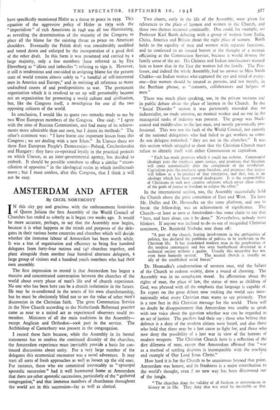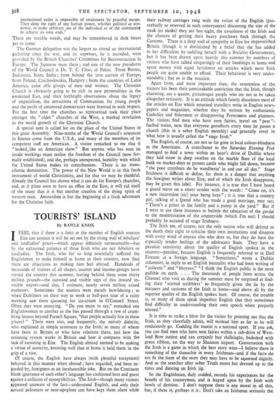AMSTERDAM AND AFTER
By CECIL NORTHCOTT
IN this city gay and gracious with the enthronement festivities of Queen Juliana the first Assembly of the World Council of Churches has ended as soberly as it began two weeks ago. It would be more accurate, perhaps, to say that the Assembly now begins, because it is what happens to the minds and purposes of the dele- gates in their various home countries and churches which will decide whether the immense labour of Amsterdam has been worth while. It was a feat of organisation and efficiency to bring five hundred delegates from forty-four nations and 147 churches together, and plant alongside them another four hundred alternate delegates, a large group of visitors and a hundred youth members who had their own assembly.
The first impression to record is that Amsterdam has begun a massive and concentrated conversation between the churches of the world about every phase of man's life and of church experience. No one who has been here can be a church isolationist in the future. He may be re-confirmed in the tenets of his own churchmanship, but he must be obstinately blind not to see the value of other men's discoveries in the Christian faith. The great Communion Service in the New Church according to the Netherlands Reformed practice came as near to a united act as experienced observers could re- member. Ministers of all the main traditions in the Assembly— except Anglican and Orthodox—took part in the service. The Archbishop of Canterbury was present in the congregation.
I record these facts because, while the Assembly in its formal statements has to confess the continued disunity of the churches, the Amsterdam experience must inevitably provide a basis for con- tinued discussions about unity. For a very large number of the delegates this ecumenical encounter was a novel adventure. It may start all sorts of fresh approaches as well as loosen up the old ones. For instance, those who are committed irrevocably to " episcopal apostolic succession" had it well hammered home at Amsterdam that there are other apostolic successions, particularly of the " gathered congregation," and that immense numbers of churchmen throughout the world are in this succession—lay as well as clerical.
Two cheers, early in the life of the Assembly, were given for references to the place of laymen and women in the Church, and those two themes recurred continually. One could, for example, see Professor Karl Barth debating with a group of women from India, China, America and Britain about the right place of women. Barth holds to the equality of men and women with separate functions, and he confessed to an inward horror at the thought of a woman officiating at the Communion Service, because it would destroy the family sense of the act. His Chinese and Indian interlocutors wanted him to know that in the East the woman led the family. The Pro- fessor, and indeed the whole Assembly, had no answer to Miss Sarah Chakko—an Indian woman who captured the eye and mind of every- one—that women should be treated as persons, and not merely, in the Barthian phrase, as " consorts, collaborators and helpers 01 men."
There was much plain speaking, too, in the private sections and in public debate about the place of laymen in the Church. In the " Social Disorder " section it was pertinently recorded that no industrialist, no trade unionist, no manual worker and no one in the managerial ranks of industry was present. The group was black- coated and middle-class to the last man, and mostly parsonically pro- fessional. This was not the fault of the World Council, nor entirely of the national delegations who had failed to get workers to come. As one delegate remarked, " they are not in the churches." It was this section which struggled to show that the Christian Church must refuse to identify itself with either Communism or capitalism.
" Each has made promises which it could not redeem. Communist ideology puts the emphasis upon justice, and promises that freedom will come automatically after the completion of the revolution. Capitalism puts the emphasis upon freedom, and promises that justice will follow as a by-product of free enterprise, and that, too, is an ideology which has been proved inadequate. It is the responsibility of Christians to seek new creative solutions which never allow either of the goals of justice or freedom to eclipse the other."
In the international section, too, the Assembly successfully held the Church above the great contention of East and West. To have Mr. Dulles and Dr. Hromadka on the same platform, and not to break the fellowship, was an achievement of significance. The Church—at least as seen at Amsterdam—has some claim to say that " here, and here alone, can it be done." Nevertheless, nobody wore blinkers. If anyone was inclined to do so out of misguided Christian sentiment, Dr. Reinhold Niebuhr, tore them off :
"A part of the church, fearing involvement in the ambiguities of politics, has declared the problems of politics to be irrelevant to the Christian life. It has abandoned modern man in the perplexities of the modern community and has seen brotherhood destroyed in a technical society without a qualm. Usually this neutrality has not even been honestly neutral. The neutral church is usually an ally of the established social forces."
Dr. Hromadka's condemnation of western man, and the failure of the Church to redeem society, drew a round of cheering. The Assembly was in no complacent mood. Its affirmation about the rights of man, the place of law, the status of men as children of
God, was phrased with all the emphasis that language is capable of. Its report on the great debate now rocking the world says inter- nationally what every Christian man wants to say privately. That is a new fact in this Christian message for the world. There will no doubt be disappointment that Amsterdam was unable to speak with one voice about the question whether war can be regarded as an act of justice. The pacifists had their say ; those who believe that defence is a duty of the modern citizen were heard, and also those
who hold that there may be a just cause to fight for, and those who now deny the possibility of a just war in view of the horrors of modern weapons. The Christian Church here is a reflection of the dire dilemma of man, except that Amsterdam affirmed that " war as a method of settling disputes is incompatible with the teaching and example of Our Lord Jesus Christ."
How hard it is for the Church to be unanimous beyond that point. Amsterdam was honest, and its frankness is a major contribution to the world's thought, even if no new way has been discovered out of the jungle.
"The churches deny the validity of all fatalism or determinism in history or in life. They deny that war need be inevitable or that international order is impossible of attainment by peaceful means. They deny the right of any human power, whether political or eco- nomic, to make arbitrary use of the individual or of the community to achieve its own ends."
These are notable words, and may be remembered in dark hours yet to come. The German delegation was the largest to attend an international
gathering since the war, and its expenses, be it recorded, were
provided by the British Churches' Committee for Reconstruction in Europe. The Japanese were there ; and one of the new presidents of the World Council is Dr. T. C. Chao, of Pekin. From Burma, Indonesia, Siam, India ; from behind the iron curtain of Europe, from Poland, Czechoslovakia, Hungary ; from the countries of Latin America, came able groups of men and women. The Christian Church is obviously going to be rich in new personalities in the awakened East, and their forthright observations about the legacy of imperialism, the attractions of Communism for young people and the perils of untutored democracies were listened to with respect. For the first time the churches so represented took their place amongst the " older" churches of the West, a marked revolution in the world growth of the Christian Church.
A special note is called for on the place of the United States in this great Assembly. Nine-teriths of the World Council's resources in finance come from the U.S.A., and many of the members of its competent staff are American. A visitor remarked to me that it " looked, like an American show." But anyone who has seen its inside workings must realise the freedom of the Council (now for- mally established), and the, perhaps unexpected, humility with which the United States makes its contributions. There is no trans- atlantic domination. The power of the New World is in this fresh instrument of world Christianity, and for that we may be thankful. Already the Council has shown what it can do for Europe's churches, and, as it plans soon to have an office in the East, it will rid itself of the taunt that it is but another creation of the dying spirit of western man. Amsterdam is but the beginning of a fresh adventure for the Christian faith.



































 Previous page
Previous page